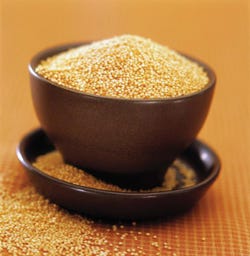How to decode whole grainsHow to decode whole grains
Scratching your head over whole grains? We offer a comprehensive user's guide to the healthy, unprocessed, fiber-rich carbohydrates. Plus, healthy whole grain recipes to try.
August 29, 2011

You may think you can decipher the various terms and seals on whole-grain foods. Still, before you grab a loaf of 12-grain bread or bag of multigrain cereal, scan the ingredient list carefully for refined grains in disguise. “Packages touting the terms stone-ground, wheat flour, enriched flour, multigrain, and cracked wheat often contain mostly refined, nutritionally inferior grains,” says Wendy Bazilian, DrPH, RD, author of The Superfoods Rx Diet (Rodale, 2008). “Always make sure the first grain or flour on the ingredient list says ‘whole,’ such as whole oats, whole wheat, or whole rye.”
Minimally processed whole grains retain the bran and germ, which are rich in disease-fighting phytonutrients, vitamins, minerals, and fiber. In a 2010 study, people who regularly ate whole grains rather than their refined counterparts packed on less visceral abdominal fat, which has been linked to a higher risk for heart disease and type 2 diabetes. Scan this chart and then head to the bulk aisle for versatile, flavorful grains.
Fiber and protein profiles are for 1 cup cooked.

Amaranth
Flavor: Nutty, slightly sweet
Fiber: 5 g
Protein: 9 g
Notable nutrients: Iron, magnesium, phosphorus
How to use: Toast in a dry skillet until seeds pop like miniature popcorn; add to salads, soups, stews, and stir-fries. Simmer for 15 minutes with apple juice, cinnamon, nuts, and dried fruit for a porridge.
TRY
Amaranth with Chipotle and Mushrooms
Spicy Amaranth Wayfarer's Bread
Buckwheat (kasha)
Flavor: Earthy, grassy, tender
Fiber: 5 g
Protein: 6 g
Notable nutrients: Magnesium, copper
How to use: Combine 1:2 grain to liquid; cook for 20 minutes. Use to bulk up chilis, meatloaf, salads, casseroles, and stews. Use buckwheat flour in pancakes and waffles.
TRY
Buckwheat-Flaxseed Blueberry Pancakes
Buckwheat and Calamari with Mango and Roasted
Kamut (khorasan wheat)
Flavor: Chewy, buttery
Fiber: 9 g
Protein: 14 g
Notable nutrients: Selenium, manganese, thiamin
How to use: Soak kernels overnight, add three parts liquid to one part Kamut, and cook for 30–40 minutes. Use in lentil salad, tabbouleh, and pilaf. Kamut pasta or flour can replace its whole-wheat counterparts.
Quinoa
Flavor: Nutty, mild
Fiber: 5 g
Protein: 8 g
Notable nutrients: Manganese, magnesium, folate
How to use: Mix one part quinoa with scant two parts liquid; cook for 12 minutes. Mix with mashed beans and spices for veggie burgers. Substitute for couscous. In baked goods, replace ¼ cup wheat flour with quinoa flour.
TRY:
Warm Quinoa and Roasted Vegetable Salad
Roasted Asparagus and Quinoa Salad
Green Tea-Scented Quinoa with Corn
Quinoa and Salmon Stew with Tomatoes
Southwestern Quinoa and Edamame Salad
Spelt
Flavor: Nutty, sweet
Fiber: 8 g
Protein: 11 g
Notable nutrients: Phosphorus, niacin, magnesium
How to use: Prepare like Kamut. Combine with herbs, diced vegetables, and lemon juice for a side dish. Substitute spelt flour 1:1 for wheat flour in baking.
TRY
Spelt Bread Stuffing with Red Delicious Apples and Dried Cherries
Sprouted grains
Sprouted grains, seeds, and legumes stand out among their whole-grain brethren, showing up increasingly in tortillas, breads, and even chips. Germinating grains amplifies some nutrient levels as the plant works to grow. Believed to be rich in enzymes, “sprouted products appear to be more hypoallergenic than whole grains,” says Wendy Bazilian, DrPH, RD. They tend to spoil faster, so they usually need to be refrigerated.
About the Author
You May Also Like





